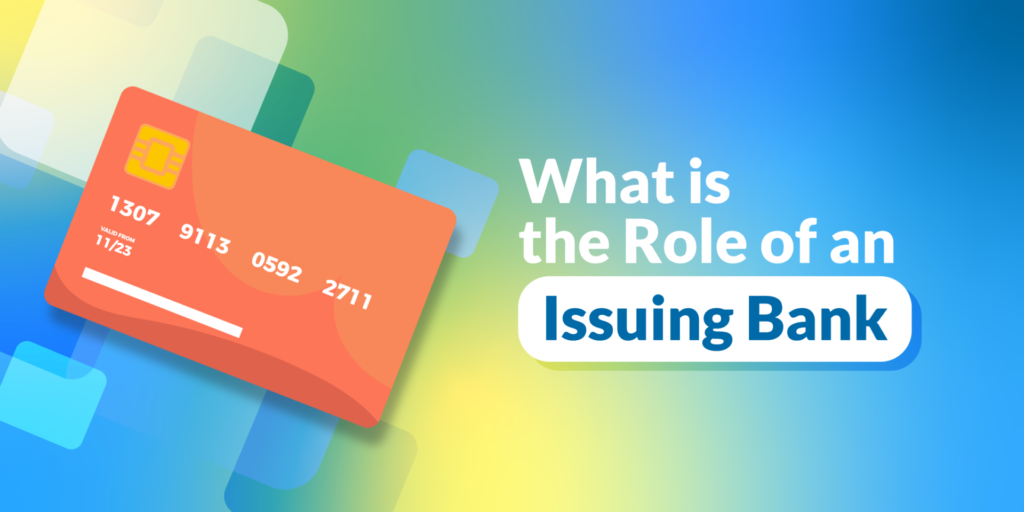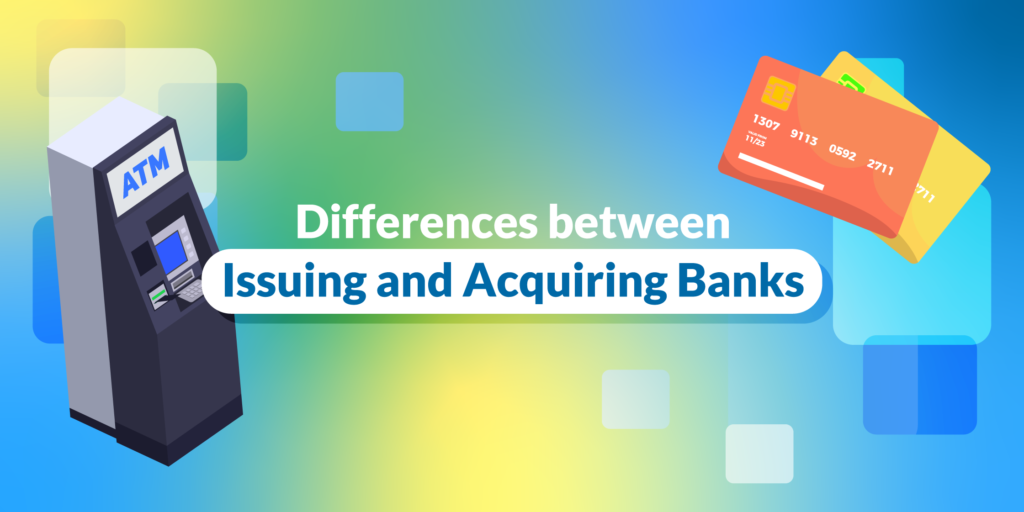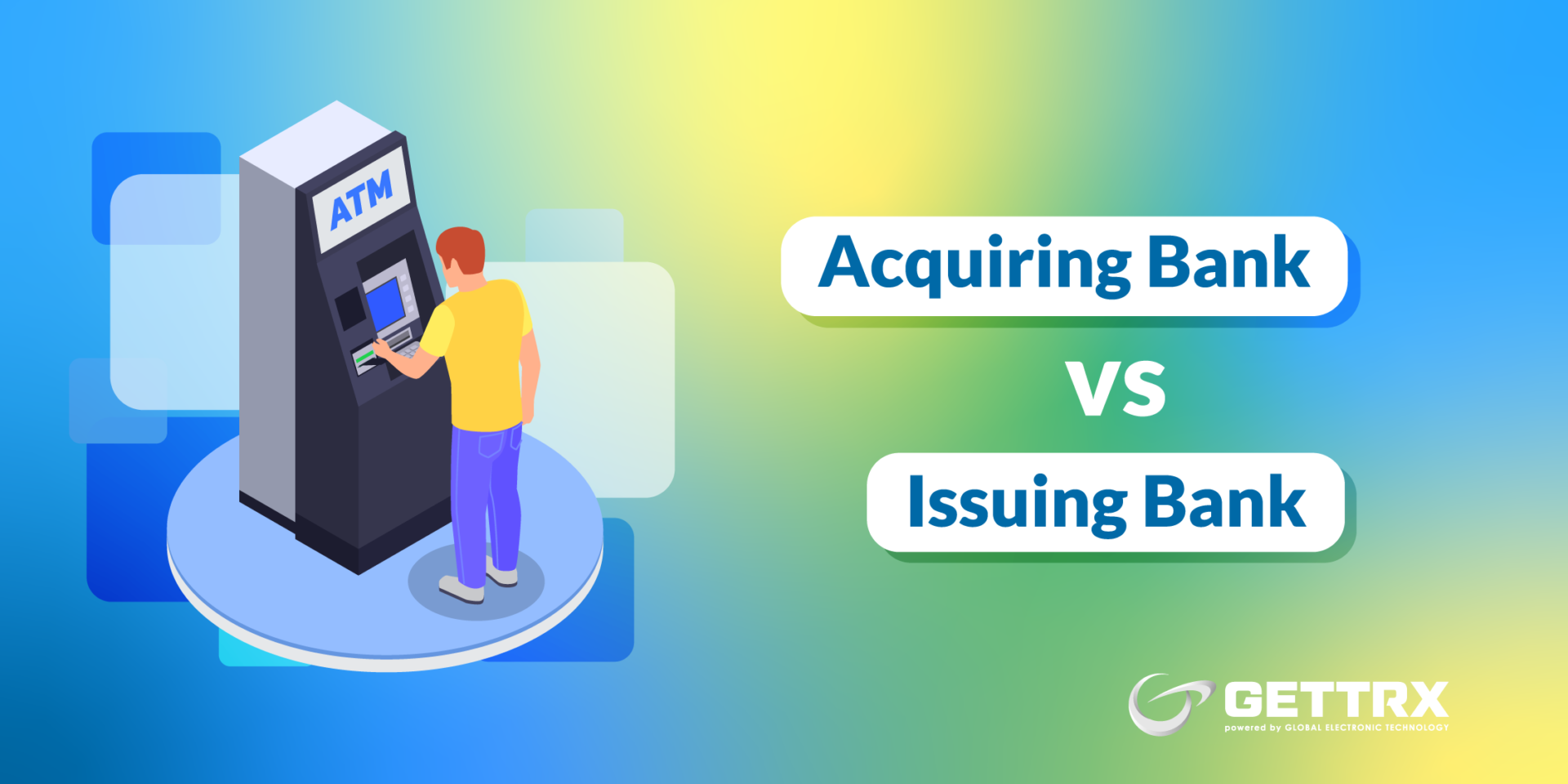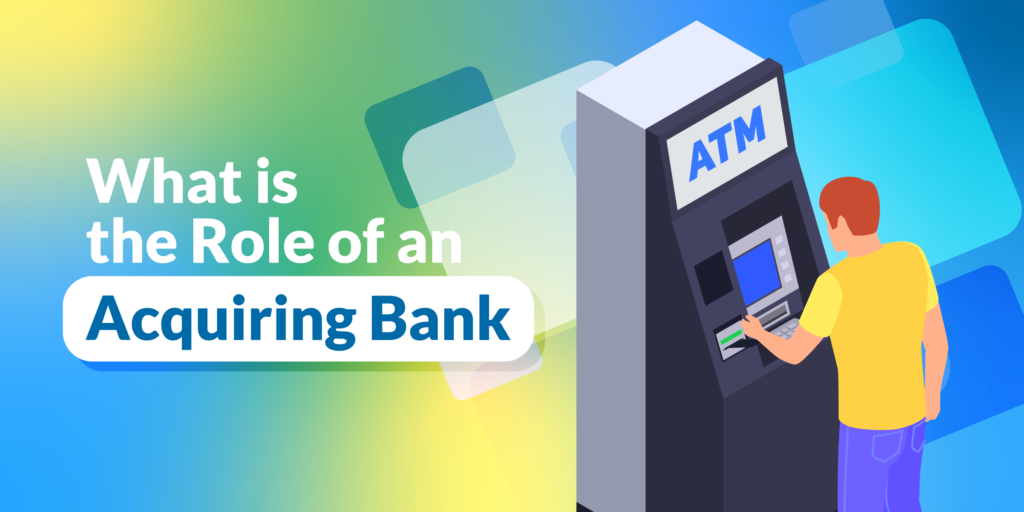Behind every swipe, tap, or online checkout, two entities work tirelessly to ensure a seamless transaction experience: the issuing and acquiring banks.
While not household names like popular retail banks, these banks play indispensable roles in our daily financial activities.
Whether buying a coffee, booking a flight, or running an e-commerce store, the issuing and acquiring banks ensure that funds move securely and efficiently across vast financial networks.
But how do they differ?
In this article, we’ll walk you through the differences between these banks, their roles, benefits, challenges, and their undeniable impact on commerce.
Let’s get started.
Table of Contents
Key Takeaways
- Issuing banks provide consumers with credit and debit cards, authorizing transactions based on available funds or credit limits.
- Acquiring banks enables merchants to accept and process electronic payments, ensuring funds are transferred promptly.
- Both banks have specific roles, with issuing banks focusing on individual consumers and acquiring banks catering to merchants.
- Each bank type offers unique advantages, from facilitating global transactions to providing security measures, but it also faces challenges like complex fee structures and potential security threats.
- Despite their differences, issuing and acquiring banks share several similarities, including their pivotal roles in the payment cycle and adherence to regulatory standards.
What is an Acquiring Bank?
An acquiring bank, often referred to as the “acquirer,” is a financial institution that establishes and maintains relationships with merchants, enabling them to accept credit and debit card payments.
It acts as a bridge between merchants and payment networks, facilitating card transaction authorization, capture, and settlement.
When a customer presents a credit or debit card for payment, the transaction doesn’t magically process itself. Instead, it embarks on a journey through electronic gateways and checkpoints.
The acquiring bank is the merchant’s partner in this journey, ensuring that the funds move correctly from the cardholder’s account to the merchant’s.
Acquiring banks also takes on a certain level of risk.
They vouch for their partnered merchants, ensuring they adhere to the regulations set by card networks.
If a merchant engages in questionable practices or generates an unusually high number of chargebacks, the acquiring bank is responsible for managing these issues.
Related Article: Merchant Acquirer vs Payment Processor
Roles of an Acquiring Bank
While often operating behind the scenes, the acquiring bank plays many roles in the payment processing ecosystem.
Its responsibilities extend beyond just facilitating transactions.
Let’s delve into the various roles and responsibilities of an acquiring bank to understand its significance.
Merchant Account Provision
One of the primary roles of an acquiring bank is to provide merchants with a merchant account. This specialized type of bank account allows businesses to accept credit and debit card payments.
When a card transaction is processed, funds are first deposited into the merchant account before being transferred to the business’s primary bank account.
Transaction Authorization
When a customer initiates a card payment, the acquiring bank is responsible for transmitting the transaction data to the card network (like Visa or MasterCard) and then to the issuing bank for authorization.
It ensures that the cardholder has sufficient funds or credit available for the transaction.
Transaction Settlement
After authorization, the acquiring bank plays a role in the settlement process. It collects the funds from the issuing bank and deposits them into the merchant’s account, typically within a few business days.
Risk Management
Acquiring banks takes on a significant amount of risk by partnering with merchants. They are responsible for assessing the potential risk of new merchant partners, monitoring transaction patterns for signs of fraud, and managing chargebacks.
If a merchant consistently generates suspicious transactions or high chargeback rates, the acquirer might take corrective actions, including imposing additional fees or terminating the merchant account.
Regulatory Compliance
Acquiring banks ensures merchants adhere to the Payment Card Industry Data Security Standard (PCI DSS) and other regulations set by card networks.
This compliance ensures that cardholder data is handled securely, minimizing the risk of breaches and fraud.
Fee Collection
For their services, acquiring banks charge merchants various fees. These can include transaction fees, monthly account maintenance fees, and other related charges.
Merchant Support and Services
Acquiring banks often provide merchants with tools, resources, and support to manage their accounts.
This can include point-of-sale (POS) systems, online payment gateways, reporting tools, and 24/7 customer support to address any issues or concerns.
Chargeback Management
In cases where customers dispute transactions, the acquiring bank manages the chargeback process.
This involves communicating with the merchant, the issuing bank, and the card network to resolve the dispute and determine if the chargeback is valid.
Educating Merchants
Acquiring banks often provide training and educational resources to merchants. The education covers fraud prevention, optimizing transaction processing, and understanding fee structures.
Essentially, the acquiring bank is a merchant’s primary partner in electronic payments.
It facilitates transactions and provides a suite of services and support to ensure that merchants can conduct business efficiently, securely, and compliantly.
What is an Issuing Bank?
An issuing bank, often simply called the “issuer,” is a financial institution that provides or “issues” credit cards to consumers on behalf of card networks such as Visa, MasterCard, American Express, and Discover.
These banks have a direct relationship with the cardholder, meaning they are the institutions you borrow from when you purchase a credit card.
While its counterpart, the acquiring bank, primarily deals with merchants, the issuing bank is the institution that most cardholders directly interact with.
When a consumer applies for a credit card, the issuing bank evaluates the application, checks the applicant’s creditworthiness, and decides whether to approve or decline the application.
Once approved, the issuing bank sets the card’s terms, including the credit limit, interest rate, and benefits or rewards associated with the card.
But it’s not just about credit cards.
Issuing banks also provide debit cards linked to consumers’ checking accounts.
When you use a debit card, the funds are directly withdrawn from your account, and the issuing bank ensures this transaction is processed correctly.

Roles of an Issuing Bank
While primarily recognized by consumers as the institution behind their credit or debit cards, the issuing bank undertakes some roles to ensure the smooth functioning of the payment ecosystem.
Its responsibilities span from risk assessment to customer service, ensuring cardholders have a seamless and secure transaction experience.
They also include:
Card Issuance
The primary role of an issuing bank is to issue payment cards to consumers.
This includes credit cards, debit cards, prepaid cards, and even certain digital or mobile payment solutions.
Credit Evaluation
For credit cards, the issuing bank assesses the creditworthiness of applicants. This involves checking credit scores, evaluating financial histories, and determining the potential risk of lending.
Based on this assessment, the bank sets the cardholder’s credit limit and interest rates.
Transaction Authorization
When a cardholder initiates a purchase, the issuing bank verifies the transaction.
It checks if the cardholder has sufficient funds (for debit cards) or available credit (for credit cards) and then approves or declines the transaction accordingly.
Billing and Statement Generation
The issuing bank generates monthly statements for credit card users detailing all transactions, outstanding balances, minimum payments due, and any applicable fees or interest.
Interest and Fee Collection
Issuing banks charge interest on unpaid credit card balances.
Additionally, they may impose fees for services like cash advances, foreign transactions, or late payments.
Risk Management
The bank continuously monitors cardholder activities to detect any unusual or potentially fraudulent transactions.
If suspicious activity is detected, the bank may temporarily block the card and contact the cardholder for verification.
Dispute Resolution
If a cardholder disputes a transaction, the issuing bank initiates the chargeback process.
They investigate the dispute, communicate with the acquiring bank and merchant, and determine if the cardholder’s claim is valid.
Customer Service
Issuing banks provide support services to cardholders. This includes handling inquiries, reporting lost or stolen cards, providing information about account balances, and assisting with other card-related issues.
Security Measures
To protect cardholders from fraud, issuing banks implement various security measures. This includes technologies like EMV chips, tokenization, and two-factor authentication. They also offer services like fraud alerts and transaction notifications.
The issuing bank plays a pivotal role in ensuring that the modern payment system functions efficiently.
They not only provide consumers with the means to transact but also ensures that these transactions are secure, transparent, and in the best interests of the cardholder.
Pros of an Acquiring Bank
Acquiring banks plays a pivotal role in the payment processing ecosystem.
Their involvement brings about several advantages, not just for the merchants they serve but also for the broader financial system.
Here are some of the primary benefits associated with acquiring banks:
Facilitates Electronic Transactions
One of the primary benefits of acquiring banks is their ability to enable merchants to accept electronic payments, including credit and debit card transactions.
This opens up a broader customer base for merchants and enhances the shopping experience for consumers.
Quick Settlements
Acquiring banks ensures that merchants receive their funds promptly.
Once a transaction is authorized and processed, funds are typically transferred to the merchant’s account within a few business days.
Enhanced Security
Acquiring banks invest heavily in security protocols and technologies, such as encryption and tokenization, to safeguard transaction data. This protects sensitive customer information, reducing the risk of fraud and data breaches.
Comprehensive Payment Solutions
Many acquiring banks offer a suite of payment solutions tailored to the needs of different businesses. This can include point-of-sale (POS) systems, payment gateways, mobile payment solutions, and more.
Access to the Global Market
With the right acquiring bank, merchants can accept payments from customers worldwide. This is especially beneficial for online businesses looking to tap into international markets.
Risk Management
Acquiring banks have robust systems in place to assess and manage transaction risks.
They monitor for suspicious activities, helping to prevent fraudulent transactions and protect merchants from potential financial losses.
Regulatory Compliance
Acquiring banks ensures merchants adhere to industry regulations, such as the Payment Card Industry Data Security Standard (PCI DSS).
This compliance support helps merchants navigate complex regulatory landscapes and avoid potential legal pitfalls.
Merchant Support
Acquiring banks often provide dedicated support teams to assist merchants with any issues or inquiries. This can include technical support, transaction queries, and guidance on optimizing payment processes.
Financial Insights
Many acquiring banks offer analytics and reporting tools that give merchants valuable insights into their sales patterns, customer behaviors, and transaction trends. This data can be instrumental in making informed business decisions.
Streamlined Chargeback Handling
Acquiring banks manage the chargeback process, assisting merchants in handling disputes and providing the necessary tools and resources to contest unwarranted chargebacks.
Scalability
As businesses grow, their payment processing needs may evolve. Acquiring banks offer scalable solutions that can adapt to changing business requirements, ensuring seamless transactions regardless of transaction volume.
Acquiring banks provides a foundation upon which modern commerce thrives. Their services, support, and technological infrastructure empower merchants to operate efficiently, securely, and profitably.
Cons of an Acquiring Bank
While acquiring banks offer many benefits to merchants and plays an indispensable role in the payment ecosystem, there are also challenges and drawbacks associated with their services.
Businesses need to be aware of these potential pitfalls to make informed decisions.
Some of the cons associated with acquiring banks include:
Fees and Charges
One of the primary concerns for merchants is the array of fees associated with acquiring bank services. These can include transaction fees, monthly maintenance fees, setup fees, and more.
Depending on the bank and the volume of transactions, these fees can accumulate and impact a business’s bottom line.
Contractual Obligations
Many acquiring banks require merchants to enter into long-term contracts. Breaking these contracts can result in hefty termination fees or other penalties.
Risk of Account Termination
If a merchant has an unusually high number of chargebacks or is suspected of fraud, the acquiring bank might terminate their merchant account, disrupting their business operations.
Holding of Funds
In some cases, especially if there’s a suspicion of irregular activity or a sudden spike in transaction volumes, acquiring banks might hold funds for an extended period, affecting the merchant’s cash flow.
Integration Challenges
While many acquiring banks offer a range of payment solutions, integrating these systems with existing business infrastructure can sometimes be complex and time-consuming.
Currency Conversion Fees
For businesses operating internationally, currency conversion can be an added expense.
Some acquiring banks might offer less favorable exchange rates or charge additional fees for currency conversion.
Potential for Data Breaches
Even with advanced security measures, no system is entirely immune to threats.
Data breaches, though rare, can have severe repercussions for merchants financially and in terms of reputation.
Customer Service Issues
Not all acquiring banks offer the same level of customer support.
Merchants might face delays in getting issues resolved, which can be problematic, especially during peak business hours.
Regulatory and Compliance Burdens
While acquiring banks assists with compliance, the onus is still on the merchant to ensure they adhere to all regulations. This can sometimes be a complex and resource-intensive process.
Limited Negotiation Power
Smaller businesses might find they have limited room to negotiate terms, fees, or contract lengths with larger acquiring banks.
Dependency
Relying heavily on a single acquiring bank can be risky. If there are technical issues, downtimes, or other disruptions, it can significantly impact a merchant’s operations.
Pros of an Issuing Bank
As the primary institutions behind the credit and debit cards, consumers use daily, issuing banks offer myriad benefits to cardholders, merchants, and the broader financial ecosystem.
Their roles extend beyond just providing a means of electronic payment.
Here are some of the advantages associated with issuing banks:
Consumer Access to Credit
One of the primary benefits of issuing banks is their ability to provide consumers with credit. This allows individuals to make purchases even if they don’t have the immediate funds, facilitating spending and potentially aiding in personal financial management.
Enhanced Security
Issuing banks invest heavily in security measures to protect cardholders from fraud.
Features like EMV chips, tokenization, and two-factor authentication are standard, ensuring that transactions are secure and cardholder data is protected.
Global Acceptance
Credit and debit cards issued by major banks are accepted worldwide, allowing cardholders to make purchases or withdraw cash almost anywhere, whether shopping online from a foreign retailer or traveling abroad.
Dispute Resolution
Issuing banks provide a structured process for cardholders to dispute unauthorized or problematic transactions. This chargeback process offers consumers a level of protection against fraud or disputes with merchants.
Financial Management Tools
Many issuing banks offer online platforms or mobile apps that allow cardholders to track their spending, set budgets, view statements, and manage their accounts seamlessly.
Emergency Services
Lost your card while traveling? Issuing banks often provide emergency card replacement services, ensuring that cardholders aren’t left stranded without a means of payment.
Flexible Payment Options
Issuing banks provides consumers with the flexibility to manage their finances. This includes options like setting up automatic payments, choosing payment due dates, or even availing installment payment plans for larger purchases.
Building Credit History
Using a credit card responsibly and making timely payments can help individuals build a positive credit history. This credit history is vital for various financial milestones, such as securing loans or mortgages.
Special Offers and Partnerships
Issuing banks often collaborate with retailers, travel companies, or other service providers to offer cardholders exclusive deals, discounts, or promotional offers.
Consumer Protection
Beyond dispute resolution, many issuing banks offer additional protections, such as purchase protection, travel insurance, or extended warranties on products purchased using their cards.
Cons of an Issuing Bank
Some of the cons associated with issuing banks include the following;
Interest Rates
One of the primary concerns for credit card users is the interest rate. If a cardholder doesn’t pay off the full balance by the due date, they can incur significant interest charges, quickly accumulating and leading to substantial debt.
Hidden Fees
Some issuing banks have a range of fees that might not be immediately apparent. These can include annual fees, late payment fees, cash advance fees, and foreign transaction fees.
Debt Accumulation
Credit cards, if not used responsibly, can lead to mounting debt. The convenience of using credit can sometimes result in overspending, making it challenging for consumers to pay off their balances.
Impact on Credit Score
Irresponsible use of credit cards, such as late payments or maxing out credit limits, can negatively impact a consumer’s credit score, affecting their ability to secure future loans or other financial products.
Complex Terms and Conditions
Credit card agreements can be dense and filled with financial jargon. This complexity can make it challenging for consumers to fully understand their obligations and the full scope of fees and charges.
Security Concerns
Despite advanced security measures, no system is entirely immune to threats. Data breaches or card theft can lead to unauthorized transactions, causing stress and potential financial loss for cardholders.
Potential for Over-reliance
The convenience of credit cards can lead some consumers to become overly reliant on them, even for everyday expenses, potentially leading to a cycle of debt.
Limited Negotiation Power
Individual consumers might find they have limited room to negotiate terms, interest rates, or fees with larger issuing banks.
Currency Conversion Costs
For those who travel or make international purchases, currency conversion fees can add up, making transactions more expensive than anticipated.
Promotional Offers and Teasers
Some issuing banks lure consumers with promotional offers, such as zero interest for a certain period. However, the interest rates can spike once the promotional period ends, catching consumers off guard.
Restrictions and Limitations
Some rewards or loyalty programs come with restrictions, blackout dates, or expiration dates, limiting the actual benefits for cardholders.

Differences between Issuing and Acquiring Banks
The table below provides a comprehensive comparison between issuing and acquiring banks.
While both are integral to electronic transactions, they cater to different audiences and have unique functions.
| Aspect | Issuing Bank | Acquiring Bank |
| Primary Role | Provides credit and debit cards to consumers. | Facilitates merchants to accept and process electronic payments. |
| Transaction Role | Authorizes or declines transactions based on the cardholder’s available funds or credit limit. | Facilitates the transaction process, ensuring funds move from the issuing bank to the merchant’s account. |
| Risk Management | Evaluates the creditworthiness of individuals before issuing credit cards. | Assesses and manages merchant risks, ensuring they adhere to card network regulations. |
| Fees | May charge cardholders annual fees, late payment fees, cash advance fees, etc. | Charges merchants various fees related to payment processing, such as transaction fees, setup fees, and monthly fees. |
| Contractual Relationships | Establishes credit agreements with individual cardholders. | Forms merchant agreements to provide payment processing services. |
| Dispute Handling | Manages disputes initiated by cardholders, such as unauthorized transactions or billing issues. | Handles chargebacks and provides tools and resources for merchants to contest unwarranted chargebacks. |
| Dispute Handling | Manages disputes initiated by cardholders, such as unauthorized transactions or billing issues. | Handles chargebacks and provides tools and resources for merchants to contest unwarranted chargebacks. |
| Security Measures | Focuses on protecting cardholders’ data and detecting fraudulent transactions. | Ensures secure transaction processing and compliance with industry standards like PCI DSS on the merchant’s end |
| Financial Products Offered | Primarily credit cards, debit cards, prepaid cards, and other consumer-focused payment cards | Offers merchant accounts, point-of-sale (POS) systems, online payment gateways, and other merchant-centric solutions |
| Global Reach | Typically allows cardholders to use their cards internationally, subject to fees. | Enables merchants to accept payments from customers worldwide, especially if they operate in the e-commerce space. |
Similarities between Issuing and Acquiring Banks
While issuing and acquiring banks have distinct roles in the payment processing ecosystem, they also share several similarities due to their interconnected functions within the financial industry.
Here are some of the key similarities between the two:
Core Participants in the Payment Cycle
Issuing and acquiring banks are fundamental in the payment card transaction process.
They work in tandem to facilitate and authorize electronic transactions, ensuring a seamless experience for cardholders and merchants.
Regulatory Adherence
Both types of banks are subject to strict regulatory guidelines and industry standards, such as the Payment Card Industry Data Security Standard (PCI DSS).
They must ensure compliance to protect cardholder data and maintain the integrity of the payment system.
Risk Management
Both issuing and acquiring banks have robust risk management systems in place.
Issuers focus on assessing the creditworthiness of cardholders, while acquirers evaluate the risks associated with partnering with merchants.
Security Protocols
Security is paramount for both banks. They invest heavily in advanced technologies, such as encryption, tokenization, and fraud detection systems, to safeguard sensitive transaction data and prevent unauthorized activities.
Financial Intermediaries
Both banks act as intermediaries in the financial system. Issuing banks bridge the gap between consumers and the credit system while acquiring banks connect merchants to the broader payment network.
Customer Support
Both types of banks prioritize customer service. Issuing banks cater to individual cardholders, addressing their queries, disputes, and concerns, while acquiring banks support merchants, assisting with transaction processing, technical issues, and account management.
Global Operations
Many significant issuing and acquiring banks operate globally, allowing cardholders to make international transactions and merchants to accept payments from customers worldwide.
Financial Health Monitoring
Both banks monitor the financial health of their clients. Issuers monitor cardholders’ credit utilization and payment patterns, while acquirers monitor merchants’ transaction volumes and chargeback rates.
Innovation and Technological Advancements
Both banks continuously innovate to stay competitive and cater to evolving customer needs, adopting new technologies and offering advanced payment solutions.
Stake in Transaction Fees
Both banks have a stake in the fees generated from card transactions.
While their fee structures and beneficiaries differ, they benefit financially from the widespread use of electronic payments.
Educational Initiatives
Many issuing and acquiring banks provide their clients with educational resources, tools, and insights, helping them make informed financial decisions and optimize their use of banking services.
Their collaborative efforts and shared objectives ensure the smooth functioning of the global payment processing system, benefiting both consumers and businesses.
Conclusion
Exploring the details of issuing and acquiring banks underscores the importance of reliable payment processing platforms in today’s digital age.
For businesses seeking a tailored, efficient, and secure payment solution, GETTRX stands out as a trusted partner.
Dive into the world of seamless transactions with GETTRX and elevate your business to new heights.
Click here to get started!
Frequently Asked Questions
Do I interact with an acquiring bank when I shop online?
Yes. When you pay, the online merchant uses an acquiring bank to process and receive the funds.
Why can an issuing bank decline a transaction?
Yes. Transactions can be declined due to insufficient funds, exceeded credit limits, suspected fraud, or other security concerns.
Can one bank be both an issuer and an acquirer?
Many large banks serve both roles, offering services to individual consumers and merchants.
How do issuing banks determine credit limits?
Credit limits are based on a consumer’s creditworthiness, including income, credit history, and debts.
Do all acquiring banks charge the same fees to merchants?
No, fees can vary based on the bank, transaction volume, type of business, and other factors.
How do issuing banks make money?
Issuing banks earn from interest on outstanding balances, fees (like annual or late payment fees), and a portion of merchant transaction fees.
Are mobile payment systems like Apple Pay and Google Wallet linked to issuing banks?
These systems are linked to credit or debit cards issued by banks, facilitating digital transactions.








